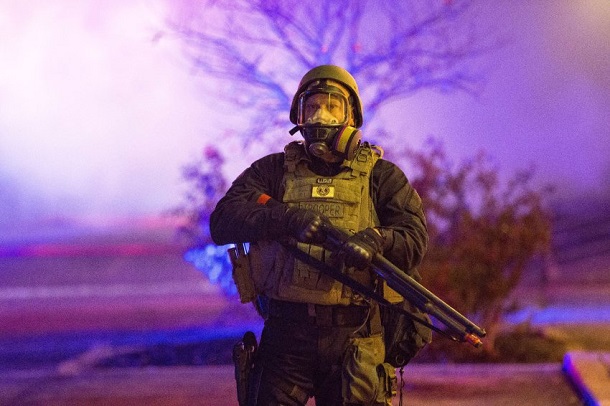The death of the black American teenager Michael Brown goes unpunished: Police Officer Darren Wilson fired in self-defense – this was the conclusion of a grand jury. The procedure was unusual, if not dubious.
Most had feared, but it was still a shock. “Good evening and thank you for your patience,” greeted District Attorney Bob McCulloch, when he moderating a lottery. For several minutes he spoke in an austere courtroom in St. Louis, without really saying anything. He praised the “State and local authorities” and scolded the “non-stop gossip in social networks”. Then he came to the point: The policeman Darren Wilson goes unpunished.
The case in Ferguson, a suburb of St. Louis, Missouri, has become a beacon: On 9 August Wilson had shot the black unarmed teenager Michael Brown. Three and a half months advised a so-called grand jury of twelve jurors, all legal layman, whether the evidence was sufficient for a charge against Wilson. Now the decision: No, it is not enough.
The death of 18-year-old Brown was “a tragic story,” McCulloch said – but no offense: Wilson, 28, had acted in “legitimate self-defense” because police if need be “deadly force” likely to exercise if they feel threatened. Brown was hit by at least six bullets.
McCulloch’s explanation seemed cool, his condolence message to the family of the dead as a duty. The mood in Ferguson and St. Louis, indeed, in the entire United States, he seemed totally unmistakable.
Because this is not just about the death of a teenager, but about racism in America to the institutionalized discrimination against US minorities – and especially avoidable police violence, mostly falling victim to black and predominantly young men.
Even President Barack Obama acknowledged that an evening: “The situation in Ferguson reflects a broader challenge that we as a nation continue to face,” he said. “In too many parts of this country, there is a deep distrust between police forces and the black communities. This is partly the result of the legacy of racial discrimination.”
Hours before the announcement of the decision, hundreds had gathered in the streets, most before Justice Center of St. Louis, in the McCulloch occurred and the police station by Ferguson. They reacted with horror, tears, anger and indignation. Among them was Brown’s mother Lesley McSpadden, the police was yelled at, “You all know that this is wrong!”
During the night, the frustration gave way to violence, looting and arson. The heavily armed police responded with tear gas and smoke grenades (more on the protests in Ferguson read here).
Also in other US cities, including Los Angeles, Chicago and New York City, thousands demonstrated for justice – not just for Michael Brown, but for all young people who are killed by the police.
It remains a mystery why the judicial decision just announced the evening – especially since the police had explicitly warned against demonstrations after dark. Chaos overshadowed the entire 108 days of deliberations. Thus Details Grand Jury deliberations were launched specifically to the press – which the integrity of the process and the decision questioned.
Although the identity of the members of the grand jury remained secret. But it was known that they consisted of nine whites and three blacks. The Panel had been used long before Brown’s death and independently. Nevertheless, the procedure was unusual, if not dubious. So McCulloch recommended from the outset no charge, as usual, to leave the final decision to a court – although the burden of proof required for Grand juries is far lower.
McCulloch has close relations with the police: Several relatives working there; his father, a police officer in St. Louis was in 1964 shot of a black, as McCulloch was twelve. 26,000 people had asked his leave of absence and the appointment of a special prosecutor in vain in a petition.
According to McCulloch, the jury met in 25 days and heard 60 witnesses – including Darren Wilson himself, who testified for four hours. He therefore feared for his life: “He was so great, and I felt so small,” Wilson said of Brown, as is apparent from the documents that have now been released.
Wilson went into hiding, even the hair should have dyed to no longer be detected. He married and met with representatives of TV broadcasters to negotiate a potential exclusive interview.
He had his education and to act in accordance with laws, shared Wilson’s lawyers said in a statement. Who wants to criticize the decision of the grand jury, should do so in a respectful and peaceful manner.
Following the decision now ask more questions than before – and answers there will not be much longer.
[adrotate group=”7″]

